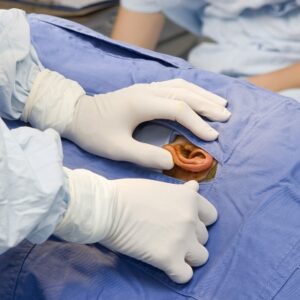
Otoplasty, known as ear surgery. It is used to reposition, resize, or alter the ears for functional or cosmetic purposes. It is often used to fix ears that protrude, don’t appear right, or have been injured. Therefore, Otoplasty has a high success rate and is generally safe. However, If ear surgery is unsuccessful, it may be physically and psychologically disturbing. So, many people ask this question: what happens if ear surgery fails?
What Does the Failure of Ear Surgery Mean?
If the patient’s expectations are not fulfilled or if there are issues that make the ears appear terrible, function poorly, or take longer to recover, the ear surgery is considered unsuccessful. Ear surgery in Islamabad normally done for several reasons.
- Adjusting the size or shape of the ears too much or too little.
- Not even the distance between the ears.
- Inadequate recovery or visible scars.
- Issues like growth that were supposed to be resolved keep recurring.
- Chronic illness, pain, or other health issues.
Why Is Ear Surgery Ineffective?
Ear surgery may not provide the desired outcomes for some reasons.
Mistakes in Surgery:
Even highly qualified professionals may make blunders. Therefore, these might include unequal ear shape, excessive cartilage removal, or improper stitch placement.
Ineffective Healing:
The way that each person’s physique improves varies. Moreover, Issues like infection, additional scarring, or delayed wound healing might result from factors including smoking, diabetes, or inadequate therapy.
Unpredictable Outcomes:
Occasionally, the cartilage or muscle may not mend as anticipated. For instance, the ears could revert to their natural position or take on an artificial appearance.
Impractical Expectations:
However, well-executed surgery might seem like a failure if patients have unreasonable or excessive expectations about the outcome.
Problems after Surgery:
Patients may suffer from improper follow-up care or unintentional harm during the healing process, including pushing on the ears or sleeping improperly.
What are the consequences of Ineffective Ear Surgery?
Several emotional and physical issues may occur from unsuccessful ear surgery:
Aesthetic Issues: Patients may feel self-conscious or uncomfortable if their ears seem uneven or unnatural.
Physical Discomfort: Issues such as persistent pain, infections, or aberrant scar tissue may make day-to-day living difficult.
Emotional Impact: If expectations are high, a failed surgery may result in anxiety, despair, or a loss of confidence.
How to Proceed If Ear Surgery Does Not Work?
The following steps should be taken if you are dissatisfied with the outcome of your ear surgery:
Talk to your surgeon:
Talk openly about your concerns with the professional who handled the procedure. They could explain what went wrong and provide a solution.
Get a Second View:
See another surgeon if your first procedure left you feeling uneasy or unconfident. A new perspective might provide more information and options for development.
Alternatives to Surgery:
Sometimes, minor flaws can be addressed using non-surgical options like fillers or laser treatments to reduce imbalance or scarring.
Recovery after surgery:
Compared to the first procedure, the recovery phase after corrective ear surgery is often lengthier or more complex.:
- Follow your surgeon’s instructions, which may include avoiding activities that might strain your ears or wearing protective hats.
- To promote quicker recovery, manage stress, eat a balanced diet, and abstain from smoking.
- It may take months for the full results to manifest as the organs settle into position and the swelling goes down.
What are the ways to reduce the failure of ear surgery?
The first step in preventing surgical failure is to prevent the procedure itself. Here’s how:
Select the best Surgeon:
Choose a surgeon with substantial otoplasty training and who is board-certified. To evaluate their work, look at before and after photos of their prior instances.
Set reasonable goals:
Recognize the limitations of surgery and discuss your objectives in detail with your surgeon.
Communicate Openly:
Throughout the procedure, talk to your surgeon about any concerns or inquiries you may have.
Final Thoughts:
Ear surgery in Islamabad might be distressing, but it’s crucial to understand that there are alternatives. Professional assistance, non-surgical options, and revision surgery may help you get the outcomes you initially desired. Selecting a skilled surgeon establishing reasonable objectives, and adhering to aftercare instructions can lower the chance of failure. However, if you are thinking of considering this surgery in Islamabad you are advised to visit Dynamic Clinic located in Islamabad and meet our best surgeon and share your concerns about the ear surgery.












